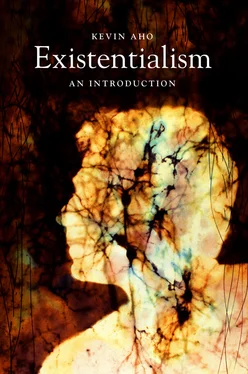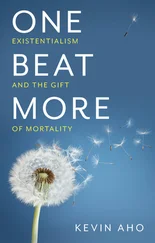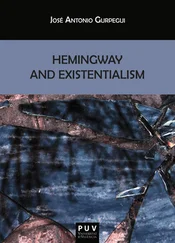In anxiety, the familiar social context that grounds my sense of who I am “collapses into itself” (Heidegger 1962, 231), and I can no longer understand my own being or identity. Without this context to orient me with a set of publicly interpreted roles and values, the world loses its significance. I am paralyzed and bewildered, unable to press forward into the future, because there is nothing that stands out as significant or meaningful anymore. This paralysis is characterized by what Heidegger calls ‘uncanniness’ ( Unheimlichkeit ), a word that captures the feeling of being abandoned, lost, or ‘not-at-home.’ In this sense, anxiety “individualizes” me, severing the familiar bond that I have with the world and leaving me exposed to confront my own “naked Dasein” (345). This exposure reveals my temporal constitution as a ‘thrown project.’ I find myself contingently thrown into a historical situation that I did not choose, as I project forward into future possibilities that terminate in my own death. This means that as long as I exist I am not a stable or secure thing but a ‘ being possible ’ because my identity remains fundamentally unfinished or incomplete. I can only be something when there are no more possibilities, when my life comes to an end. This is why anxiety is so crucial for the prospect of self-realization. By bringing me face-to-face with the fact that my existence comes to an end, anxiety “snatches [me] back” (435) from the tranquilized drift of everydayness, reminding me that my choices and actions are not to be taken lightly because they alone give my life the meaning and coherence that it has.
When Heidegger refers to our existence in terms of ‘being- toward-the-end’ or ‘being-toward-death,’ this has nothing to do with our physical demise, a heart attack, or dying of old age but to the idea that our existence gains its meaning from death as our temporal limit. Without an end, our lives have no shape or direction, and there would be no worldly episode or project that stands out as significant in any way. As Charles Guignon suggests, in the same way that events in a story are meaningful only insofar as they contribute to the outcome of the story, so the events in my own life are meaningful only in relation to the overarching goals and projects that define my “life story as a totality, right up to the end” (Guignon and Pereboom 2001, 201). With the anxious awareness of my own death, my decisions and commitments are made with a renewed sense of urgency and focus, with the recognition that the stand I take on my situation contributes to the realization of the kind of person that I am, and that I alone am responsible for the coherence, integrity, and direction of my life. The inauthentic response to anxiety is a flight back into the security of our public routines, becoming lost once again in ‘the they.’ The authentic response is what Heidegger calls ‘resoluteness’ ( Entschlossenheit ).
Resoluteness, for Heidegger, “means letting oneself be summoned out of one's lostness in ‘the they’ ” (1962, 345). It refers to the steady, clear-sighted, and focused stance toward life that can emerge only in confronting my own death. Such a confrontation shakes me out of the drift of everydayness and opens up the possibility to “pull [myself] together” (441, my emphasis) by taking a stand on an identity and values that matter to me. But resoluteness does not detach me from the world, turning me into an “isolated subject” (233) or “free-floating ‘I’ ” (344). It is true that I am individualized with anxiety, but individualized “ as being-in-the-world ” (233). This means that when I commit myself to a particular identity as a dutiful soldier, for instance, or a responsible father, it is not one that I create ex nihilo . These identities are already meaningful because they have been publicly interpreted by the world that I have been thrown into. It is true that I take them over, appropriate them in particular ways, and, in this sense, make them mine , but the cultural meaning and significance of these identities have already been established by my sociohistorical context.
The aim of Heidegger's account of authenticity is to show that when I make a commitment in the face of death, I not only inject my life with a dimension of intensity and seriousness that was missing; I am also providing a sense of cohesion and unity to my life as a whole. But there is always the temptation of being pulled back into the scattered shallows of ‘the they.’ This is why Heidegger, following Kierkegaard, argues that I need to continually ‘anticipate death’ and ‘repeat’ the commitment to who I am. But this does not mean I stubbornly cling to a particular identity. By anticipating death I realize there is no guarantee that this commitment will matter to me for the rest of my life. Thus, my commitment is always penetrated by a ‘ not ’ because I remain flexible and open to the possibility of “ taking it back ” (355) if it is no longer significant or meaningful to my own situation. This recognition, that whatever identity I commit myself to I am also not that person, is radicalized in Sartre's conception of authenticity.
Bad faith and nothingness
In a similar way that self-deceptive ‘falling’ is a structure of being human for Heidegger, so is ‘bad faith’ a structure for Sartre. Again, Sartre develops the existentialist configuration of the self as a relational tension or struggle between two distinct aspects, ‘facticity’ and ‘transcendence.’ Facticity refers to the facts about my situation that limit and constrain me such as my physical traits, my social circumstances, and my past patterns of conduct. Transcendence refers to the self-conscious way that I relate to these facts, how I choose to interpret them, make them meaningful, and transform them through my actions. Inauthenticity or bad faith emerges when I deny one of these two aspects of myself. I am in bad faith, for instance, when I deny the freedom I have to take a stand on my situation and see myself as not responsible because I am wholly determined by it. And I am also in bad faith when I deny that I am limited by my situation and see myself as wholly free, and my life as completely open-ended.
In Being and Nothingness , Sartre offers a number of vivid examples that capture various incarnations of bad faith. His description of the French waiter, for instance, reveals a man who denies his transcendence:
All his behavior seems to us a game. He applies himself to chaining his movements as if they were mechanisms, the one regulating the other; his gestures and his voice seem to be mechanisms; he gives himself the quickness and pitiless rapidity of things. He is playing; he is amusing himself. But what is he playing? We need not watch long before we can explain: he is playing at being a waiter in a café. (1956, 101–102)
The waiter sees himself as the public sees him. He is constrained by an occupational stereotype and is restricted to certain behaviors because of it. On Sartre's account, he gives in to ‘the look’ of the customers that reduces him to an object, to a ‘being-in-itself.’ By disappearing into this persona, the waiter appears to be deceiving himself by refusing to take responsibility for it and denying the fact that there are other choices and self-interpretations that are available to him. But the waiter is, at the same time, transcending his facticity by breaking the rules of being a waiter. He does this by performing his tasks in an exaggerated way. He overdoes things; his mannerisms are too mechanical; he moves too quickly; he is too much of a French waiter. He is playing the role of the waiter in such an exaggerated and overdone way that he actually escapes the role (Bernasconi 2007, 38). This is why Sartre says, “I am a waiter in the mode of being what I am not ” (1956, 103). The waiter is also ‘not’ a waiter because his thing-like identity is always open to being negated.
Читать дальше












